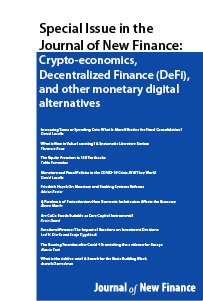Volume 2, Number 4 (2021) Crypto-economics, Decentralized Finance (DeFi), and other monetary digital alternatives (1)
Crypto-economics is a catchy term for an interdisciplinary, emergent study area that combines ideas and concepts from economics, game theory, and related disciplines in the design and analysis of peer-to-peer, cryptographic systems in which some form of exchange of value takes place. The origins of such systems can be traced to Bitcoin in 2009 and following “alt-coins”, but the emergence of programmable protocols in the form of “smart contracts”, starting with the Ethereum network, encouraged entrepreneurs and innovators to devise and deploy a diversity of crypto-economic mechanisms. These started with “tokens”, including fungible (e.g. ERC20) and non-fungible or collectibles (e.g. ERC721), but that now spans to a variety of organizations and models that have come to be known as “decentralized finance” (DeFi). A critical development in DeFi was the launch of MakerDAO in 2014, and its related stable-coin DAI, a decentralized alternative to previous attempts to attain stable tokens. The launch in 2018 of Uniswap was a cornerstone for moving users to decentralized exchanges, and a collection of innovations followed. The recent inception of Ethereum 2.0 and the emergence of other smart contract blockchain networks that target DeFi suggest that the field would expand with a high pace of innovation (including of course failures). The above-described landscape has received limited attention from scholarly research, with most of the literature focusing on the analysis of prices, volatility, and properties using the same methods for non-blockchain-based assets and services. This special issue aims at fostering discussion, inquiry, and thorough analysis of crypto-economics, decentralized finance, and other digital monetary alternatives. That is because crypto-economics and decentralized finance are not the only innovations with the potential to disrupt the existing monetary arrangements. Experimentations with and proposals for “stable-coins,” as mentioned above, but also for “Central Bank Digital Currencies” (CBDC).Articles
Redefining Banking Through Defi: a New Proposal for Free Banking Based on Blockchain Technology and DeFi 2.0 Model
Francesco Spinoglio
The Curse of Central Bank Digital Cash
Fernando Ulrich and Leonidas Zelmanovitz
Cryptocurrency, Decentralized Finance, and the Evolution of Money: A Transaction Costs Approach
James L. Caton Jr and Cameron Harwick
Regulating Bitcoin - On What Grounds?
William J. Luther


